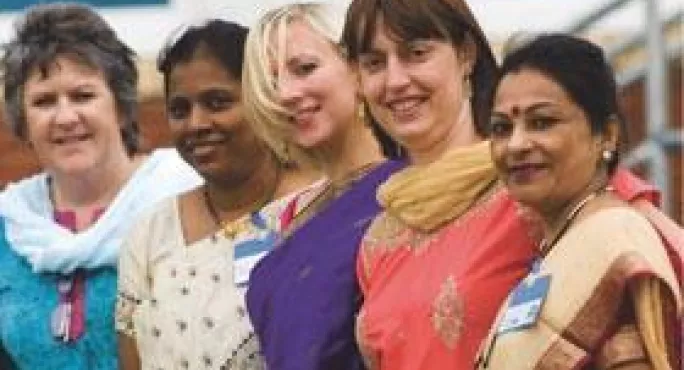Harping on Hindi: how two colourful cultures found some common ground

The only national anthem you usually hear played on a harp is Hen Wlad Fy Nhadau (Land of my fathers). But teachers from India were treated to a rendition of their country’s tune played on Wales’s national musical instrument during a cultural exchange last week.
Pupils at Ysgol Gyfun Bro Morgannwg in Barry also acted out a colourful Hindu marriage ceremony, followed by traditional Welsh dancing, to mark the arrival of the Indian teaching contingent.
The visit was part of a British Council-funded project that aims to give teachers a taste of a different culture and education system.
Dozens of schools around the UK are taking part in the UK-India Education and Research Initiative.
Tegwen Ellis, head of Ysgol Cynwyd Sant in Maesteg - one of the other schools involved in the project - said the experience had made her reflect on her Welsh heritage.
When she heard about the initiative, the first thing she did was contact the other Welsh-medium schools involved to build stronger links with fellow teachers and gain a fresh perspective on her own work.
“We are all at different points in our headship careers,” she said. “Through the project, we are learning about the different good practice that exists in different schools in Wales, as well as in India.”
She said teachers from the two countries found they had much in common, despite coming from very different backgrounds.
The five Welsh-medium schools involved are all state-funded and from different authorities in Wales, while the six private English-speaking schools in India’s capital New Delhi are a mix of Hindu and Christian denominations; one even has a “slum school” attached.
“We all have perceptions of countries, and we have only been able to see it through film and books. But people’s perceptions are not always the true picture,” Mrs Ellis said.
“Both countries are very passionate about cultural traditions and their heritage. We wanted to demonstrate the cultural aspect, which is very rich in Wales.”
Mrs Ellis said the Indian teachers were amazed by Wales’s Eisteddfod celebrations and fascinated by the play-led foundation phase.
“They can’t get over the fact we have one teacher or teaching assistant for every eight reception pupils,” she said.
And the exchange of ideas went both ways. When Mrs Ellis visited India in January, she found it an eye-opening experience.
“Classes are much larger in India and they don’t use the outdoors,” she said. “I was also struck by the more old-fashioned style of schooling. Children walk in single file; they are very disciplined and have great respect for the principal.”
In one school, she was greeted by pupils dressed in a handmade Welsh national costume designed from pictures on the internet.
“The amount of knowledge the children already had about Wales was amazing,” she said. “It was full of colour and dance and music. It’s emotional to think that they had learnt so much about our Welsh customs.”
Although the programme is aimed at the professional development of teachers, it has fed into nearly every part of the curriculum.
Pupils have learnt the Indian national anthem in Hindi, studied the symmetry of the Taj Mahal and used live video links to talk to children in India.
“Our primary pupils asked simple questions such as, `What kind of food do you eat?’, `Who’s your favourite footballer?’, which shows the naivety of their understanding,” Mrs Ellis said.
“But the level of questions from the Indian children was very different. They asked in-depth questions about the Government, scientific inventions and about space. We also had some confusion and questions about whales, rather than Wales.”
Mrs Ellis said the experience had enabled her teachers to look inwards to Wales, as well as outwards, and it had helped them become more critical about their teaching.
“Sometimes we only learn the surface of our culture in Wales - children learn the national anthem and about the national costume, but do they understand who wrote the anthem or how the Assembly government has evolved?” she said.
Pupils at her school have given presentations about Wales. She said the lessons have fed into the school effectiveness framework, which is intended to narrow the achievement gap between Wales’s best and worst- performing schools through the sharing of good practice.
Although the project is initially funded for just three years, Mrs Ellis hopes it will continue for much longer.
“It isn’t a pupil exchange project. It is more to do with professional development for teachers and embedding that understanding in their lessons. But if it is going to be sustainable it has to be built on friendship and has to be led by pupils. I think the strength of the idea is the way the two clusters have become very close,” she said.
Fifteen go wild in Mozambique
It is not just teachers who are jetting off to foreign climes. In July, 15 teenagers from Lewis School Pengam will spend two weeks in Mozambique studying wildlife.
The trip, organised by conservation group Operation Wallacea, will also give the Years 11-13 students the chance to learn to dive.
James Fletcher, a Year 13 student and former climate change champion for Wales, said it would be the trip of a lifetime. “We have worked hard and raised money through events such as packing bags in supermarkets,” he said.
He intends to pursue a degree in politics, while other students involved plan to use their experiences as part of their Welsh baccalaureate qualification.
Keep reading for just £1 per month
You've reached your limit of free articles this month. Subscribe for £1 per month for three months and get:
- Unlimited access to all Tes magazine content
- Exclusive subscriber-only stories
- Award-winning email newsletters



